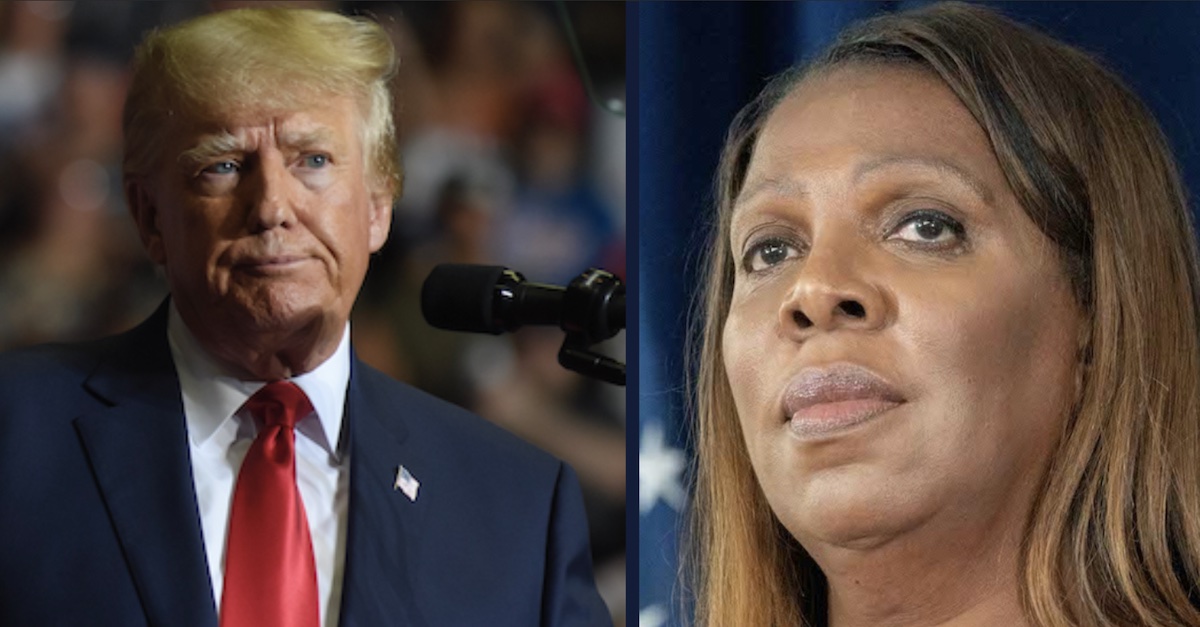
Donald Trump, Letitia James
A federal judge in Florida refused on Wednesday to grant former President Donald Trump’s request to intrude upon New York Attorney General Letitia James’s enforcement action in connection with her fraud case.
“The Trump Organization has already been found guilty by a New-York jury of several counts of tax fraud,” U.S. District Judge Donald M. Middlebrooks noted in an eight-page ruling. “To now impede a civil Enforcement Action by the New York Attorney General would be unprecedented and contrary to the interests of the people of New York.”
In November, Trump filed a lawsuit in a state court in Florida seeking to block James from “requesting, demanding, possessing or disclosing” amendments to his trust in connection with her fraud case. His original lawsuit was later transferred to federal court.
Shortly after the lawsuit’s original filing, Manhattan Supreme Court Justice Arthur Engoron ordered a court-appointed monitor to watch over the Trump Organization pending a trial slated for next year. James’s lawsuit against Trump, his adult children and his businesses alleges a years-long pattern of tax fraud. She also wants to bar the former president and the family members named in her suit from ever serving as an officer or director in any New York corporation.
In his lawsuit, Trump claimed James targeted him for a “relentless, pernicious, public, and unapologetic crusade” that preceded the Democratic AG’s election.
“James’ war of intimidation and harassment on President Trump, his family, his business interests, and his associates is longstanding and continuing,” Trump’s Nov. 2 lawsuit said. “James campaigned for Attorney General on the promise of launching investigations of President Trump before even the pretext of a predicate existed. Since her election, she made good on those campaign promises and established within her office a policy of intimidating and harassing President Trump whenever possible.”
Multiple courts have denied Trump’s claims of political motivations, including Engoron, a New York appellate court, and a federal court in New York.
According to James, the actual pattern is Trump shopping around in various courts in an attempt to “end-run” other judges’ rulings and her own prosecutorial discretion.
“This action is Mr. Trump’s second improper attempt to collaterally attack and end-run around rulings that have been issued by the presiding judge in the New York proceedings, Justice Arthur Engoron,” her assistant AG recently wrote.
Judge Middlebrooks rejected Trump’s motion for a preliminary injunction late on Wednesday, finding the former president’s lawsuit would likely fail.
“Defendant raises four reasons — all of which are likely correct — why Plaintiff has no substantial likelihood of success on the merits,” wrote Middlebrooks, a Bill Clinton appointee. “First, it is not at all clear that a federal court sitting in West Palm Beach, Florida, has personal jurisdiction over the Attorney General of New York. Second, this action is barred by New York’s interstate sovereign immunity.”
Middlebrooks also denied the request on the grounds of issue and claim preclusion, meaning the matter was already decided in a binding decision of another court.
The attorney general also argued that Trump’s bid failed under the Supreme Court’s Rooker-Feldman precedent. Under that doctrine, James noted, a “state-court loser” cannot seek to collaterally attack the court’s final, appealable orders. Middlebrooks agreed.
In November, Middlebrooks wrote a blistering ruling sanctioning Trump’s lawyers for filing a massive, “frivolous” and “shotgun” lawsuit accusing Hillary Clinton and dozens of other supposed political antagonists of a vast conspiracy to tar him with Russia collusion allegations. The judge found it amounted to little more than a political statement masquerading as a legal action.
“The rule of law is undermined by the toxic combination of political fundraising with legal fees paid by political action committees, reckless and factually untrue statements by lawyers at rallies and in the media, and efforts to advance a political narrative through lawsuits without factual basis or any cognizable legal theory,” Middlebrooks wrote in his Nov. 10 ruling. “Lawyers are enabling this behavior and I am pessimistic that Rule 11 alone can effectively stem this abuse. Aspects may be beyond the purview of the judiciary, requiring attention of the Bar and disciplinary authorities. Additional sanctions may be appropriate.”
Trump appealed that sanctions ruling to the 11th Circuit.
Read the ruling here.